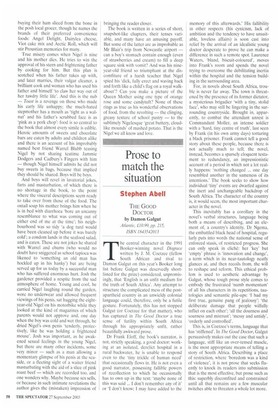Prose to match the situation
Stephen Abell
THE GOOD DOCTOR by Damon Galgut Atlantic, £10.99, pp. 215, ISBN 1843542013 The central character in the 1991 Booker-winning novel Disgrace written by J. M. Coetzee (fellow South African and rival to Damon Galgut on this year's Booker long list before Galgut was deservedly shortlisted for the prize) considered, unpromisingly, that 'English is an unfit medium for the truth of South Africa'. Any attempt to structure the complicated mess of the postapartheid country in an unwieldy colonial language could, therefore, only be a futile gesture. Fortunately, this has not stopped Galgut (or Coetzee for that matter), who has captured in The Good Doctor a true sense of futility within South Africa through his appropriately unfit, rather beautifully awkward prose.
Dr Frank Eloff, the book's narrator, is not, strictly speaking, a good doctor: working at an isolated, derelict hospital in a rural backwater, he is unable to respond even to the 'tiny trickle of human need' that occasionally flows in. He is not even a good narrator, possessing fallible powers of recollection to which he occasionally has to own up in the text: 'maybe none of this was said ... I don't remember any of it' or 'I don't know; I may have added to the memory of this afterwards.' His fallibility in other respects (his cynicism, lack of ambition and the tendency to have unsuitable, loveless affairs) is soon cast into relief by the arrival of an idealistic young doctor desperate to prove he can make a difference in such a remote spot. Laurence Waters, 'bland, biscuit-coloured', moves into Frank's room and spends the novel trying to overcome the debilitating inertia within the hospital and the tension building in the surrounding area.
For, in novels about South Africa, trouble is never far away. The town is threatened by the presence of its former dictator, a mysterious brigadier 'with a tiny, stolid face', who may still be lingering in the surrounding countryside. Brought in, apparently, to combat the attendant unrest is Commandant Moller, an intense soldier with a 'hard, tiny centre of truth', last seen by Frank (in his own army days) torturing a black prisoner. Frank cannot tell a good story about these people, because there is not actually much to tell; the novel, instead, becomes a sparsely eloquent testament to redundancy, an impressionistic account of a period in which not a lot really happens: 'nothing changed ... one day resembled another in the sameness of its intentions.' The book seeks to show how individual 'tiny' events are dwarfed against the inert and unchangeable backdrop of South Africa. The character of the country is, it would seem, the most important character in the novel.
This inevitably has a corollary in the novel's verbal structures, language being both a means of describing, and an element of, a country's identity. Dr Ngema, the embattled black head of hospital, regularly puts into words the national sense of enforced stasis, of restricted progress. She can only speak in cliché: her 'key' but 'empty' phrase is 'innovation and change', a term which in its near-tautology neatly glances at, and then recoils from, the will to reshape and reform. This ethical problem is used to aesthetic advantage by Galgut, whose tough prose style comes to embody the frustrated 'numb momentum' of all his characters in its repetitions, tautologies and semantic pile-ups: 'I had my first true, genuine pang of jealousy': 'the deliberate damage that people wilfully inflict on each other'; 'all the dourness and sourness and mistrust'; 'messy and untidy', 'orderly and controlled'.
This is, in Coetzee's terms, language that has 'stiffened'. In The Good Doctor, Galgut persuasively makes out the case that such a language, stiff like an over-tensed muscle, is the most appropriate means of telling a story of South Africa. Describing a place of restriction, where 'boredom was a kind of violence', it is not prose that seeks fluently to knock its readers into submission that is the most effective, but prose such as this: superbly discomfited and constrained until all that remains are a few muscular twitches able to threaten a whole lot more.


























































































 Previous page
Previous page